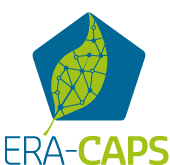Isolation of key genes for kernel development through the identification, in a collection of 300 mutant lines, of Mutator insertions in genes expressed in the maize seed
- Acronym MuExpress
- Duration 1 April 2007 - 1 April 2010
- Project leader Gregorio Hueros, University of Alcalà de Henares, Spain
-
Other project participants
Christophe Tatout, Biogemma [Company], France
Peter Rogowsky, University of Lyon, France
Udo Wienand, University of Hamburg, Germany
-
Funding
National Institute for Agricultural Research (INRA), France
Research Centre Juelich – Project Management Juelich (FZJ-PTO) on behalf of the Federal Ministry of Education and Research (BMBF), Germany
Ministry for Education and Science (MICINN), Spain
- Total Granted budget € 922,522
Abstract
Maize is essential for world nutrition and widely cultivated in France, Spain and Germany. The size and shape of the two seed compartments (embryo and endosperm) is determined during seed development, a process involving an estimated 1000 genes. Less than 10% are known today and the identification and characterisation of genes involved in seed development presents a major scientific and agronomic challenge.
The project aims at the identification and functional analysis of genes involved in maize seed development via the large scale molecular characterisation of transposon induced maize seed mutants. It is based on a collection of 300 mutants selected from a much larger initial collection based on a clean 3:1 segregation of the mutant phenotype and a stable phenotype over at least 3 generations. These mutants have been selected as being particularly defective in endosperm rather than embryo formation, thus enriching for mutations in genes preferentially involved in endosperm formation. After a minimum of 2 backcrosses the material is genetically quite homogenous and genomic DNA of wildtype and mutant pools is available. In a sister group of 300 mutants the bottleneck has been the identification of the transposon copy responsible for the phenotype among the roughly 100 copies present in the genome. To circumvent the very low efficiency of the AIMS technique on genomic DNA encountered in previous experiences, we propose here to decomplexify the system and to apply the technique to seed cDNA. All FSTs will be systematically sequenced opening not only the way for the subsequent co-segregation studies that will link the phenotype to a single FST but also creating a valuable inventory of Mutator insertions in coding sequences present in the material. A strong bioanalysis of the candidate sequences using all available tools in maize as well as the synteny to rice and other cereals will provide insight into the potential molecular function of the candidate genes. Among others the expression profiles of the candidates will be extracted from existing micro-array data and the in silico map position in the maize genome compared with the positions of seed QTLs.
